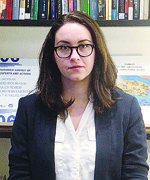
BRUSSELS: Kuwait has played a key role in the reconciliation process within the six member Gulf Cooperation Council (GCC), according to an European expert on Gulf issues. "Of course (the late Amir) Sheikh Sabah Al-Ahmad Al-Jaber Al-Sabah is primarily to be credited here, but it is comforting to see that the new leadership is continuing his work," Dr Cinzia Bianco, Gulf Research Fellow at the pan-European think-tank, European Council on Foreign Relations, said in an interview.
"The wider Arab-Islamic region is unfortunately enmeshed in several tensions, regional stability will continue to need players like Kuwait, investing political energy in diplomacy, mediation and stabilization including through the humanitarian aid," said Bianco who holds an MA in Middle Eastern Studies from King's College London and a PhD in Gulf Studies from the University of Exeter, the UK.
Kuwait Foreign Minister and Acting Information Minister Sheikh Dr Ahmad Nasser Mohammad Al-Sabah announced, on December 4, "fruitful" talks were held recently, in regards to achieving reconciliation and supporting Gulf and Arab solidarity and stability. "Within the framework of reconciliation efforts, previously led by His Highness (the late Amir) Sheikh Sabah Al-Ahmad Al-Jaber Al-Sabah, and in continuation of the efforts currently being carried out by His Highness Sheikh Nawaf Al-Ahmad Al-Jaber Al-Sabah, the Amir of Kuwait, and US President Donald Trump to resolve the crisis, fruitful discussions took place recently, in which all parties affirmed their keenness on Gulf and Arab solidarity and stability and to reach a final agreement that would achieve the aspirations of lasting solidarity between their countries and achieve what is good for their people," he said in public address on state TV.
Meanwhile, Bianco referred to the recent elections held in Kuwait and noted that the new National Assembly has many newcomers. She opined that the new Amir of Kuwait His Highness Sheikh Nawaf Al-Ahmad Al-Sabah "has a longstanding experience in navigating Kuwait's domestic policy." Commenting on the coronavirus situation, the Gulf expert said "like many others around the world, Kuwaitis are facing economic and social challenges stemming from the pandemic," and she stressed that "Kuwait's strength has always been that citizens have the opportunity to express those grievances."
On EU-GCC relations, she said there are positive prospects ahead and described Kuwait-EU relations as excellent. She explained that relations between the two regional organizations have for decades developed at the biregional level while individual countries from Europe and from the Gulf developed their own bilateral ties.
In the past few years the EU has reached out to individual Gulf monarchies to establish its own bilateral relations, she noted. "This is a new framework that offers more flexibility and the opportunity to strengthen cooperation tailored to the specific needs and assets of each GCC country," said Bianco who between 2013 and 2014 was a research fellow on Sharaka, a European Commission project on EU-GCC relations. "The growing interest in Europe towards the Gulf as a region means that there are certainly positive prospects ahead for cooperation, especially in the domains of economy, society and health," she stressed.
"While political relations remain more complex when we look at the wider GCC, ties between the EU and Kuwait are excellent - with converging interests on promoting stability, security and prosperity in the wider region," she added. The European Council on Foreign Relations has a network of offices in seven European capitals, with 60 staff members from more than 25 different countries and a team of associated researchers in the EU 27 member states. - KUNA









